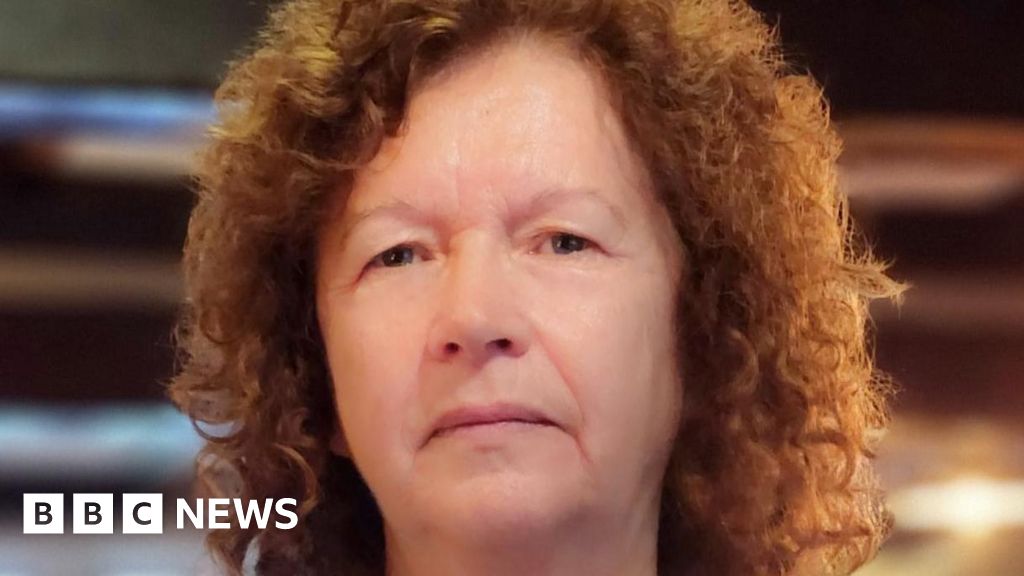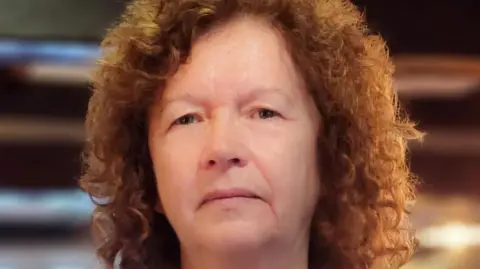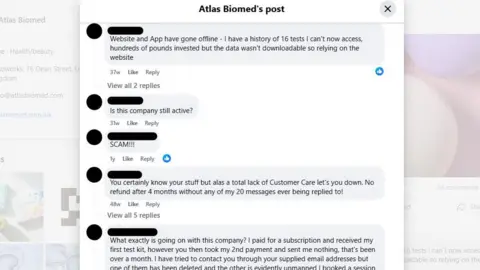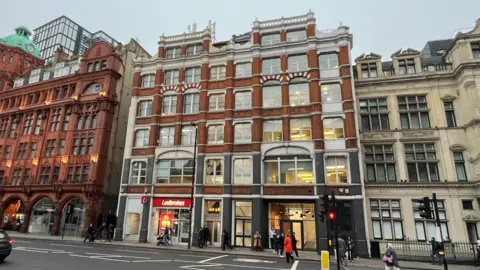I gave my DNA to tracking company – then it vanished

 Kate Lake
Kate LakeA DNA-testing firm appears to have ceased trading – without telling its customers what has happened to the highly sensitive data they shared with it.
Atlas Biomed, which has offices in London, offered to provide insights into people’s genetic make up as well as their predisposition to certain illnesses.
However, users are no longer able to access their personalised reports online and the company has not responded to the BBC’s requests for comment.
Customers of the firm describe the situation as “very alarming” and say they want answers about what has happened to their “most personal information”.
The regulator, the Information Commissioner’s Office (ICO), has confirmed it has received a complaint about Atlas Biomed.
“People have the right to expect that organisations will handle their personal information securely and responsibly,” it said in a statement.
Experts say it shows how users of DNA-testing services can find themselves “completely at the mercy” of such companies when it comes to protecting very sensitive data.
Disappearing DNA reports
Lisa Topping, from Saffron Walden, Essex, sent a saliva sample to Atlas Biomed several years ago, paying around £100 for a personalised genetic report.
As well as telling her about her DNA profile, it claimed to also inform her about her predisposition to diseases and even injuries, taking into account information she had provided in an accompanying questionnaire.
She could access her report online – which she checked from time to time – until one day the website disappeared. She got no reply when she contacted them to ask what had happened.
“I don’t know what someone else could do with [the data] but it’s the most personal information… I don’t know how comfortable I feel that they have just disappeared,” Lisa told me.
In 2023, Kate Lake from Tonbridge, Kent, paid Atlas Biomed £139 for a report it never delivered.
It promised her a refund – then went silent, despite her trying every means of contact she could find.
“I just never heard back from anyone, it’s like no-one was at home,” she said.
She describes the situation as “very alarming.”
“What happens now to that information they have got? I would like to hear some answers,” she said.
The BBC was also unable to contact Atlas Biomed.
A phone number listed for the company is dead. The BBC visited its offices in London, but there was no sign of Atlas Biomed there.
The firm’s Instagram account, with over 11,000 followers, was last updated in March 2022. Its final post on X was in August the same year.
It shared a post on Facebook in June 2023, but did not respond to any of the comments – which were full of people complaining about being unable to contact it or access their profiles.
 Facebook
FacebookRussia links
The apparent disappearance of Atlas Biomed is a mystery – but it appears to have links with Russia.
It is still listed as an active company with Companies House, where all UK-based businesses must register. However, it has not filed any accounts since December 2022.
It lists eight official positions – though four of its officers have resigned.
Two of the apparently remaining officers are listed at the same address in Moscow – as is a Russian billionaire, who is described as a now resigned director.
Atlas Biomed’s registered office is near London’s so-called Silicon Roundabout, one of the prime locations in the UK for tech firms.
When the BBC visited, there was no sign of Atlas Biomed itself, but a company registration firm based in the building confirmed that it was a client of theirs, and legitimately used the address as its own.

This firm, in an email, claimed that it could not put the BBC in touch with Atlas Biomed “for security purposes”.
“We highly suggest that you contact them directly,” it said.
No-one from Atlas Biomed has responded to the BBC’s attempts to contact it.
Cybersecurity expert Prof Alan Woodward said the apparent links to Russia were “odd.”
“If people knew the provenance of this company and how it operates they might not be quite so ready to trust them with their DNA,” he told the BBC.
‘At their mercy’
None of this explains where Atlas Biomed’s database of customer DNA has ended up – and the BBC has seen no evidence it is being misused.
But Prof Carissa Veliz – author of Privacy is Power – points out that DNA is arguably the most valuable personal data you have. It is uniquely yours, you can’t change it, and it reveals your – and by extension, your family’s – biological strengths and weaknesses.
Biometric data is given special protection under the UK’s version of GDPR, the data protection law.
“When you give your data to a company you are completely at their mercy and you have to be able to trust them,” Prof Veliz said.
“We shouldn’t have to wait until something happens.”
Additional reporting by Graham Fraser
Related
Why investing in women is a vital next step for…
Get Nadine White's Race Report newsletter for a fresh perspective on the week's newsGet our free newsletter from The Independent's Race CorrespondentGet our fre
Business secretary signals major shift on electric car policy to…
In a determined effort to retain Nissan’s manufacturing presence in Britain, Business Secretary Jonathan Reynolds has vowed to implement “substantial c
Joint Statement: Business Secretary and Fujitsu Services Ltd
Business and Trade Secretary Jonathan Reynolds today (Friday 7 March) met chiefs for Fujitsu in Tokyo to begin talks over the cost of redress for victims of th
UK foreign secretary backs multilateral defence funding for Europe
UK foreign secretary David Lammy has said that a new multilateral fund will be needed to secure Europe’s defence as he confirmed that Britain is “open to”














